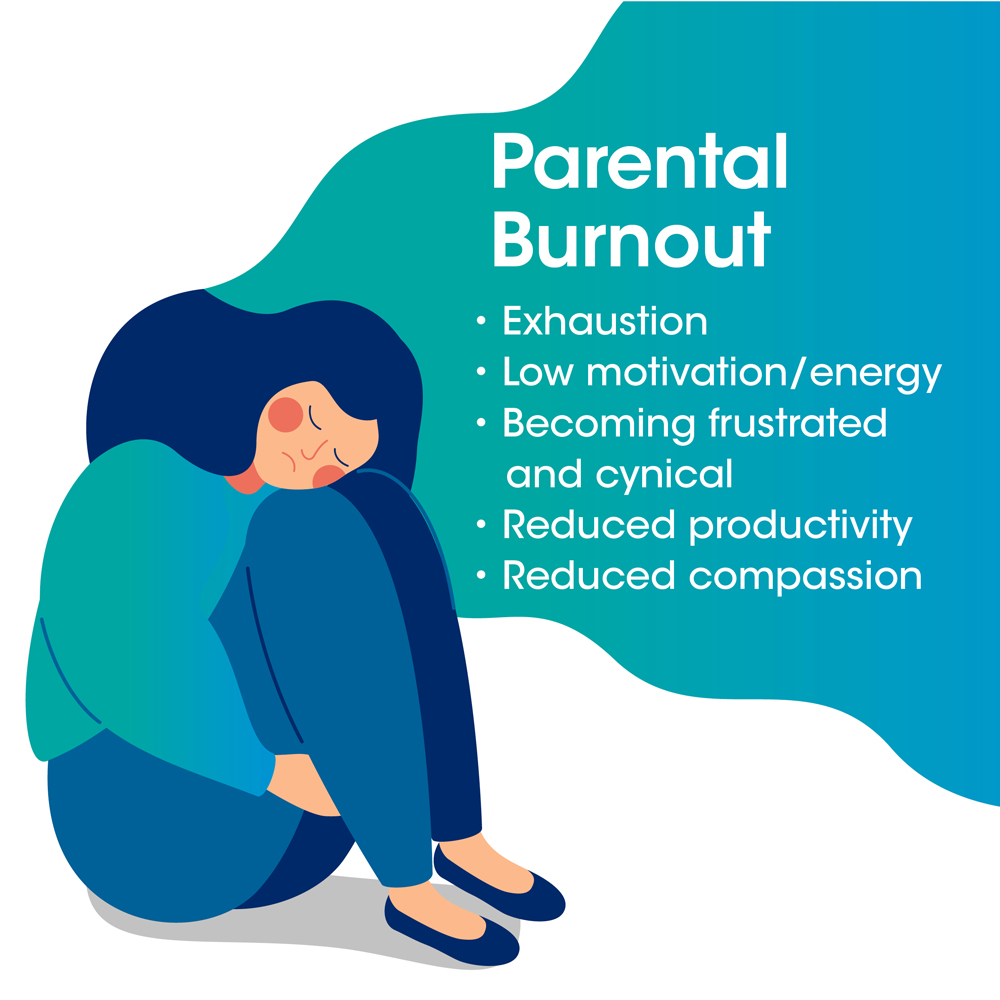Parenting can be one of the most rewarding experiences but can also bring overwhelming stress and fatigue. The continuous demands of raising children, maintaining a household, and balancing work-life responsibilities often lead to what experts call parental burnout. For mindful practices, it’s crucial to recognize the signs early and take action before they affect your mental and physical well-being. In this post, we’ll explore the symptoms of parental burnout, and the stages of parenting burnout, and share valuable insights on how to avoid burnout and restore balance to your life.
What is Parental Burnout?
Parental burnout is the emotional, mental, and physical exhaustion that parents experience due to the constant demands of caring for their children. It’s not just about being tired after a long day. It’s a persistent feeling of overwhelm, detachment, and helplessness that can lead to depression and anxiety.

1. Parental Burnout Symptoms:
Recognizing the symptoms of parental burnout early is crucial. These signs may include:
- Extreme Fatigue: Feeling physically and emotionally drained all the time.
- Loss of Interest: You may lose interest in activities you once enjoyed or feel disconnected from your children.
- Emotional Numbness: Feeling overwhelmed and emotionally detached, leading to frustration or anger.
- Sleep Issues: Difficulty sleeping, either because of constant worrying or feeling too stressed.
- Physical Complaints: Chronic headaches, stomach issues, or other stress-related symptoms.
If you experience any of these symptoms of parenting burnout, it’s essential to address them before they escalate.
2. The Stages of Parenting Burnout:
Understanding the stages of parenting burnout can help you pinpoint where you are in the cycle and take action to recover. Here are the key stages:
- Overwhelm: At first, you might feel like you’re constantly running on empty but can still manage the tasks. The demands of parenting are higher, and you feel like you’re always chasing after something.
- Emotional Exhaustion: As time passes, the stress builds up, leading to a feeling of emotional depletion. You might feel like you’re no longer able to give your best to your kids.
- Detachment: By the final stage, you may start to withdraw emotionally from your children, which can affect your relationships and parenting effectiveness.
Recognizing these stages will help you avoid the deep exhaustion that comes with burnout and guide you to find the right solutions.
3. How to Avoid Parental Burnout:
The best way to combat parental burnout is through prevention. Here are some tips on how to avoid parental burnout:

- Take Time for Yourself: Carve out moments in your day for self-care. Whether it’s a short walk, reading a book, or just sitting in silence, taking care of your own needs is essential.
- Ask for Help: Don’t be afraid to reach out to your partner, family members, or friends for help. Parenting doesn’t have to be done alone.
- Create a Schedule: Organization can relieve stress. Having a clear routine for both you and your children can reduce unpredictability and increase your sense of control.
- Set Boundaries: Learn how to say no to extra responsibilities that will stretch you too thin. Protecting your emotional space is vital.
4. Managing Parental Burnout: Practical Tips for Coping
Once you identify the symptoms of parental burnout, it’s crucial to adopt strategies for managing them. Here are some practical tips for managing burnout:
- Mindfulness and Meditation: Practices like meditation or deep breathing can help you calm your mind and restore emotional balance.
- Exercise: Physical activity helps to release tension and boosts your mood. It doesn’t have to be intense; even a daily walk can make a difference.
- Therapy and Support: Talking to a therapist can help you process your feelings of burnout. Support groups or online communities for parents can also be valuable.
- Managing Parental Burnout Depression: If your burnout leads to depression, it’s crucial to seek professional help. Depression can worsen burnout, so early intervention is key.
5. Parental Burnout Book Recommendations:
If you want to dive deeper into managing parental burnout, several books offer great advice and guidance. One of the best resources is:
- “Burnout: The Secret to Unlocking the Stress Cycle” by Emily Nagoski and Amelia Nagoski – A deep dive into how stress affects our body and practical steps to combat it.
These books provide actionable steps to help you recover and prevent further parental burnout.
6. Managing Parental Burnout with ADHD Parenting:
Parents of children with ADHD may experience more intense stress due to the additional challenges ADHD brings to daily life. Managing ADHD parent burnout involves:

- Understanding ADHD behavior and how it affects family dynamics.
- Setting realistic expectations and establishing a predictable routine.
- Seeking professional support to handle ADHD-related challenges.
By managing your own emotional health, you can better support your child and reduce stress.
Conclusion:
Parental burnout is a common issue for many parents, but it can be managed with the right strategies. By understanding the stages of parenting burnout, and adopting practical tips to avoid it, you can reclaim your energy and joy as a parent. Remember, it’s essential to take care of yourself first to take care of your family.
If you’re feeling burned out, don’t wait until it becomes overwhelming. Take proactive steps to restore your well-being and create a healthier, more balanced parenting experience.
FAQS:
How to handle burnout as a parent?
To handle burnout, prioritize self-care, set realistic expectations, and seek support from family, friends, or professionals. Establishing boundaries and taking time for yourself can help restore balance.
What are the symptoms of parental_burnout?
Symptoms include emotional exhaustion, detachment from children, irritability, chronic fatigue, and physical issues like headaches or sleep problems. Parents may also feel overwhelmed and unable to enjoy daily activities.
How to manage parent stress?
Managing parent stress involves creating a routine, practicing mindfulness, exercising, and asking for help when needed. Taking breaks and focusing on personal well-being are essential for reducing stress.
How does parental burnout affect children?
Parental burnout can lead to emotional withdrawal, less engagement, and difficulty providing necessary support to children. This can affect a child’s emotional development, behavior, and attachment to the parent.
External Resources:
American Psychological Association – Managing Parental Stress

Empowering parents to raise happy, confident kids. Get practical parenting tips and advice on our blog, Smart Parent Guides.
